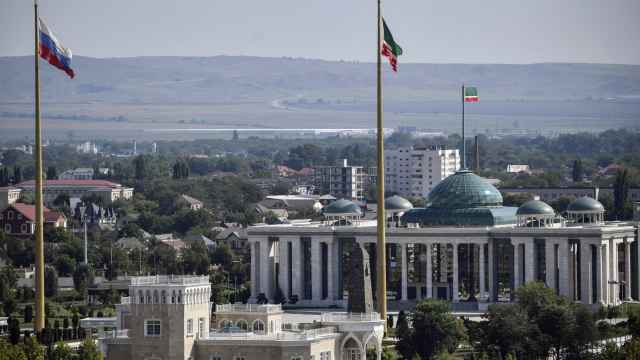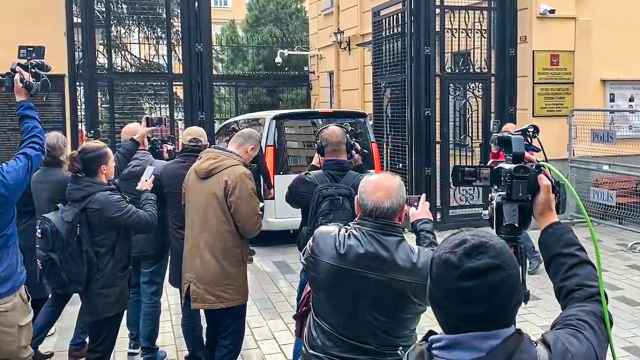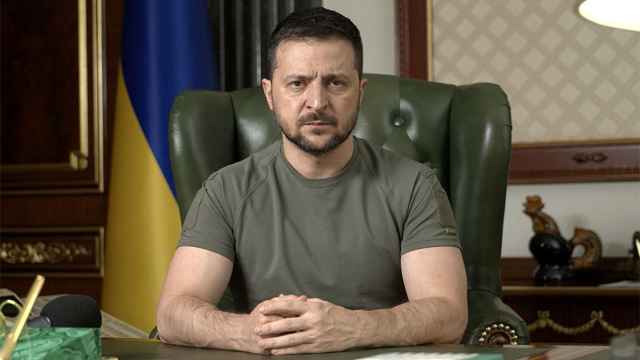I confess that when the Kursk nuclear submarine sank in August 2000, I first felt respect for then-President Vladimir Putin exactly for the reasons that many of my colleagues blame him — and still blame him — for mishandling the incident.
For example, I could easily explain to myself why the president did not cut his vacation short and immediately return to Moscow when he first learned of the explosion on the Kursk. Considering how little a president can realistically do in such situations, it makes no difference whether he was located in Sochi or Moscow.
What’s more, it is no small task for a president to travel — especially on short notice. It amounts to a major logistical operation and entails distracting many people’s plans, including the president himself, from work. This is the last thing you’d want under the circumstances.
I also recall how Putin met with relatives of the Kursk sailors in their hometown of Vidyayevo shortly after the accident. Shaken by grief, the people lashed out at the newly elected president and blamed him for the loss of their loved ones. With sincere compassion, Putin explained that the fleet’s search and rescue equipment was not the only thing to have fallen into disrepair during the chaotic 1990s, when the government dedicated itself to enriching its favorite oligarchs.
This is how Kommersant journalist Andrei Kolesnikov in 2002 described Putin’s meeting with relatives of the Kursk sailors: “He emerged from the meeting as the respected president of those who, before the meeting, were prepared to tear him to pieces.”
Furthermore, when U.S. television host Larry King interviewed Putin several weeks after the Kursk accident and asked him, “What happened to the Kursk?” I was not shocked by Putin’s often-ridiculed response, “It sank.” After asking such a stupid question, King got the answer he deserved. It was as though King had come to the interview directly from an uninhabited island where there were no televisions or newspapers.
Exactly 10 years have passed, and the country is once again confronted with a new crisis: drought and wildfires that have taken lives and destroyed homes. An angry letter addressed to Putin by the blogger top_lap is quite similar to the anger and rage that the relatives of the Kursk victims expressed to Putin in August 2000.
But Putin heavily missed the mark this time. In his answer to the blogger, Putin wrote: “At the end of the workday, breathing in the smoke from the burning fires like all Muscovites are doing, I — with great interest and pleasure — acquainted myself with your evaluation of the situation.”
For Putin to draw any parallel between the daily condition of villagers and that in which he lives would be like telling people who are caught in the endless traffic jams caused by government motorcades: “Hey, I feel your frustration. I drive on the same streets as you do.”
The other misfire was when Putin carried out a cheap PR stunt by co-piloting an airplane and personally dousing two wildfires in the Ryazan region. Who was he trying to fool?
It seems that after 10 years in power, Putin has lost touch with the so-called “Putin majority.” This may be the reason why polls by the Public Opinion Fund and VTsIOM have shown a sharp decline in his ratings this past week.
Alexei Pankin is editor of WAN-IFRA-GIPP Magazine for publishing business professionals.
A Message from The Moscow Times:
Dear readers,
We are facing unprecedented challenges. Russia's Prosecutor General's Office has designated The Moscow Times as an "undesirable" organization, criminalizing our work and putting our staff at risk of prosecution. This follows our earlier unjust labeling as a "foreign agent."
These actions are direct attempts to silence independent journalism in Russia. The authorities claim our work "discredits the decisions of the Russian leadership." We see things differently: we strive to provide accurate, unbiased reporting on Russia.
We, the journalists of The Moscow Times, refuse to be silenced. But to continue our work, we need your help.
Your support, no matter how small, makes a world of difference. If you can, please support us monthly starting from just $2. It's quick to set up, and every contribution makes a significant impact.
By supporting The Moscow Times, you're defending open, independent journalism in the face of repression. Thank you for standing with us.
Remind me later.





